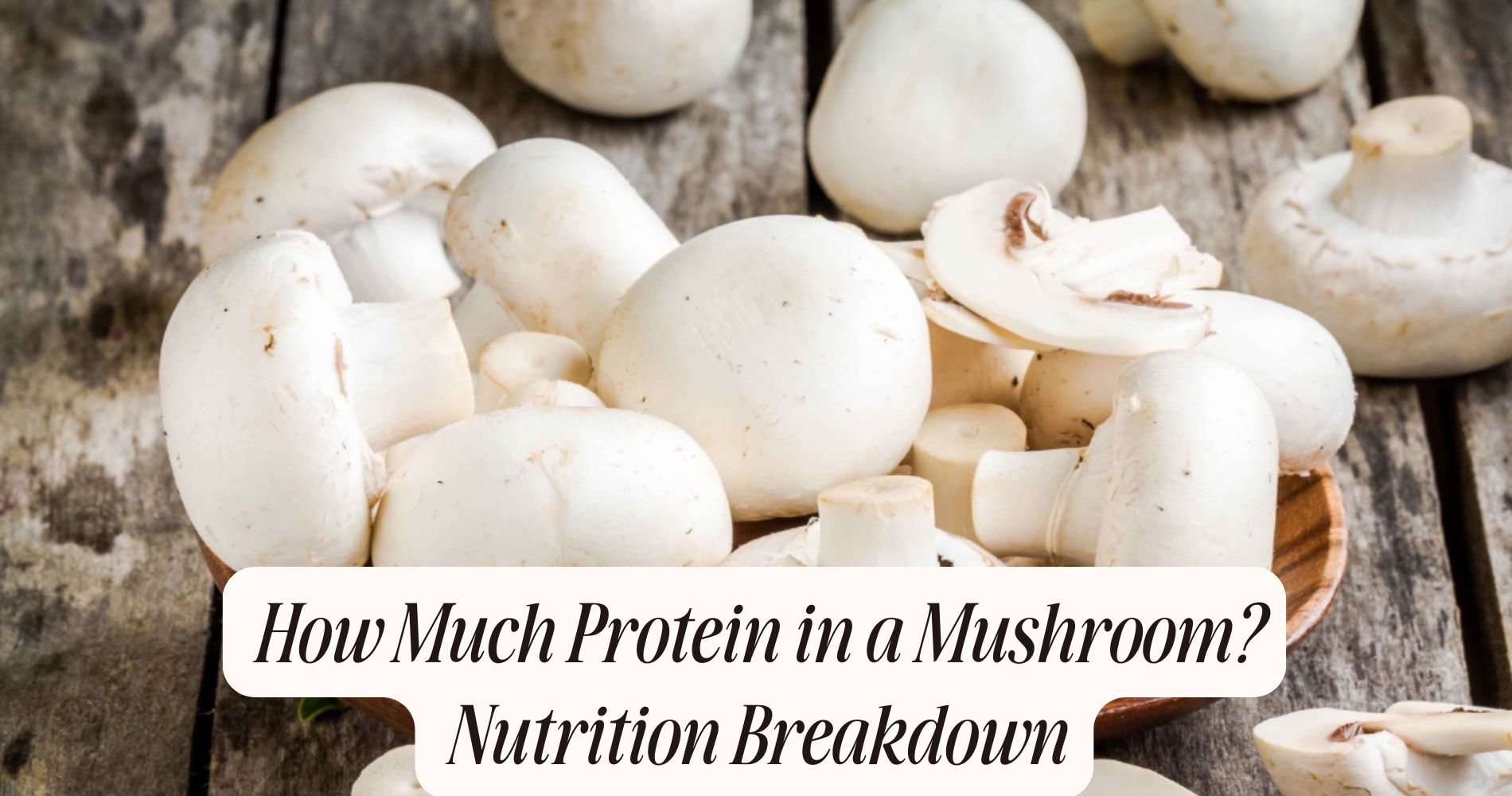
How Healthy Are Mushrooms for You? Science-Backed Benefits
How healthy are mushrooms for you? Mushrooms are nutritional powerhouses that provide a variety of health benefits. They are low in calories yet rich in essential B vitamins, fiber, and minerals such as selenium and potassium, especially in types like portobello and shiitake. Beta-glucans in mushrooms boost your immune system while antioxidants protect your cells from damage. They also support heart health by lowering cholesterol and promote brain function with neuroprotective effects. Discover how these fungi can play a significant role in overall wellness.
Nutritional Profile of Mushrooms
Although often overlooked as a nutritional powerhouse, mushrooms offer an impressive array of nutrients that can enhance your diet. Their nutrient density varies across mushroom varieties, making them a versatile addition to your meals.
For instance, white button mushrooms are low in calories yet rich in B vitamins, which support energy metabolism. Portobello mushrooms, on the other hand, provide beneficial fiber and essential minerals like selenium and potassium.

Shiitake mushrooms are known for their high copper content, crucial for maintaining healthy blood vessels and bones. Adding these diverse mushroom varieties to your plate not only boosts nutrient intake but also supports overall health.
Immune-Boosting Properties
When it comes to strengthening your immune system, mushrooms stand out due to their unique bioactive compounds.
These fungal compounds, like beta-glucans, play an essential role in enhancing your body's immune response. Research shows that beta-glucans activate white blood cells, key players in defending your body against pathogens.
Additionally, mushrooms contain polysaccharides that stimulate cytokine production, further reinforcing your immune response. Studies suggest that regularly consuming mushrooms can lead to enhanced immune function, providing your body with a robust defense against infections.
Moreover, mushrooms like shiitake and maitake have been found to modulate immune activity, helping your body maintain balance.
Heart Health Benefits
If you're looking to improve your heart health, mushrooms offer a range of benefits supported by scientific research.
They're rich in compounds like beta-glucans and eritadenine, known for their potential to lower cholesterol levels. By reducing the bad LDL cholesterol, mushrooms play an essential role in maintaining healthy arteries.

Additionally, these fungi are packed with antioxidants that help improve blood circulation, ensuring that your heart receives an adequate supply of oxygen and nutrients.
Studies indicate that the bioactive components in mushrooms can enhance vascular function, contributing to overall cardiovascular well-being.
Including mushrooms in your diet may also help reduce inflammation, a known risk factor for heart disease.
Mushrooms and Brain Function
Just as mushrooms support heart health, they also offer remarkable benefits for brain function. Consuming mushrooms regularly can lead to cognitive enhancement thanks to bioactive compounds like ergothioneine and hericenones. These compounds play a significant role in supporting memory and mental clarity.
Studies have shown that mushrooms offer neuroprotective effects, potentially reducing the risk of neurodegenerative diseases such as Alzheimer's. The presence of nerve growth factors in certain mushroom varieties promotes the growth and survival of neurons, which is essential for maintaining ideal brain health.
Additionally, the anti-inflammatory properties of mushrooms can help mitigate inflammation-induced cognitive decline, ensuring your brain operates at its best. By incorporating mushrooms into your diet, you're nurturing your brain's longevity and functionality.
Antioxidant Powerhouses
Although you might overlook them in your diet, mushrooms are true antioxidant powerhouses that can greatly enhance your health. Various mushroom varieties like shiitake, maitake, and reishi are rich in antioxidant compounds such as ergothioneine and glutathione.
These powerful antioxidants protect your cells from oxidative stress and reduce the risk of chronic diseases. Scientific studies have shown that these compounds neutralize harmful free radicals in your body, which helps in maintaining cellular integrity and longevity.

Incorporating different mushroom varieties into your meals can boost your antioxidant intake and provide a natural defense against the ravages of aging and inflammation.
Mushrooms in Weight Management
Beyond their impressive antioxidant capabilities, mushrooms also play a significant role in weight management. With their low calorie density and high fiber content, mushroom varieties like shiitake, portobello, and cremini can help you feel full longer, reducing overall calorie intake.
Research shows that swapping meat for mushrooms in certain dishes can lower caloric intake without sacrificing flavor or satisfaction. This makes mushrooms an excellent choice for those focused on portion control.
Additionally, mushrooms are rich in protein and essential nutrients such as B-vitamins and selenium, which support metabolism and energy production.
The Role of Mushrooms in Gut Health
When it comes to supporting gut health, mushrooms offer a unique array of benefits that shouldn't be overlooked. They possess prebiotic properties, meaning they provide nourishment for the beneficial bacteria in your gut microbiome. A healthy gut microbiome is essential for digestion, immune function, and even mental health.
By consuming mushrooms, you're effectively promoting the growth of these good bacteria, which in turn helps maintain a balanced gut environment.
Studies show that specific mushroom varieties, like shiitake and maitake, contain polysaccharides, which act as prebiotics. These compounds selectively encourage the proliferation of beneficial bacteria while inhibiting harmful ones.

Including mushrooms in your diet can enhance gut health, reducing inflammation and supporting a well-functioning digestive system. They're a natural, effective way to nurture your gut.
Culinary Versatility and Enjoyment
Mushrooms aren't just allies for your gut; they're also stars in the kitchen, offering remarkable culinary versatility and enjoyment.
With various cooking techniques, you can transform their texture and flavor profiles to suit any dish. Grilling or roasting mushrooms enhances their umami, making them a hearty addition to meals. Sautéing them in olive oil or butter can highlight their natural earthiness, adding depth to soups and stews. Additionally, mushrooms absorb other flavors easily, allowing them to complement spices and herbs beautifully.
Evidence suggests that incorporating mushrooms into your meals not only boosts flavor but also contributes essential nutrients like vitamins B and D, selenium, and antioxidants.
Elevate Your Wellness with SUPER MUSHROOM GUMMIES
Looking for a convenient way to enjoy the health benefits of mushrooms? Try SUPER MUSHROOM GUMMIES by Well Gummies! Packed with 10 powerful mushroom extracts, these vegan-friendly gummies fuel your brain, boost immunity, and enhance focus—without the jitters or crash. Plus, they taste like fresh wild berries, making them a delicious and easy addition to your daily routine. Experience calmer energy, sharper thinking, and balanced well-being in every bite!
Frequently Asked Questions
Are Mushrooms Safe to Eat Raw?
You should be cautious with raw mushroom consumption as some types might contain toxins. Proper mushroom preparation methods like cooking can reduce risks and enhance nutrient absorption, promoting a safer and healthier eating experience. Always choose fresh, safe varieties.
Can Mushrooms Help With Sleep Disorders?
You're wondering if mushrooms can help with sleep disorders. Research shows that some mushroom extracts may improve sleep quality by regulating sleep patterns and reducing anxiety. Consider adding them to your routine, but consult a healthcare professional first.
Do Mushrooms Have Any Anti-Aging Properties?
You might find mushrooms beneficial for anti-aging. They contain antioxidants that combat cellular aging by neutralizing free radicals. Studies show these compounds can improve skin health and potentially slow down age-related cellular damage, promoting a youthful appearance.
Are There Any Risks of Mushroom Allergies?
You might experience mushroom allergy symptoms like hives or difficulty breathing. Although mushroom allergy prevalence is low, it's essential to recognize potential reactions. Consult a healthcare professional if you suspect an allergy for a detailed analysis and management plan.
How Do Mushrooms Affect Blood Sugar Levels?
Mushrooms help regulate blood sugar levels by improving insulin sensitivity. You benefit from their compounds that enhance your body's response to insulin, potentially lowering blood sugar spikes and supporting overall metabolic health. They're a nutritious addition to your diet.
Conclusion
Incorporating mushrooms into your diet offers a myriad of health benefits. They're nutrient-rich, boosting your immune system while supporting heart health. Their positive impact on brain function and antioxidant properties can't be overstated. Mushrooms aid in weight management and contribute to a healthy gut, enhancing overall well-being. With their culinary versatility, you can easily enjoy these benefits. Embrace mushrooms as a delicious, health-focused addition to your meals, backed by science and detailed analysis.




